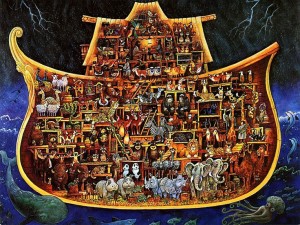by John Holbrook Jr.
A Biblical View, Blog #010 posted September 19, 2016, edited March 9, 2021.
One of the many Bible stories on which skeptics like to jump with both feet is the account of Noah’s ark – particularly the claim that the ark carried a male and female of every sort or kind of animal on earth. How, they ask, could the ark contain elephants, lions, tigers, rhinoceroses, giraffes, etc. and the food necessary to sustain them– let alone how eight people could tend them and keep the ark from becoming an unsanitary and nauseous dungeon? Surprisingly, the answer is simple and came to me from an unlikely source.
According to my chronology of ancient history, the Antediluvian Era lasted roughly 1656 years (3977-2321 BC). The Bible makes clear that the men of this era (a) failed to honor God and his commandments and (b) indulged in every form of iniquity. Some of the trouble appears to have been caused by (a) the nephilim (sometimes translated “giants”), who were mighty men of renown and may have been warriors that introduced conflict and war into antediluvian life and (b) marriages between “the sons of God” (perhaps God-honoring covenant-keepers) and the “daughters of men” (perhaps God-dishonoring covenant-breakers), thereby becoming “unequally yoked.”
In any event, God became disgusted by the behavior of his creatures and decided to destroy the civilization which they had managed to construct.[1] God instructed Noah to build an ark in which to preserve his family and representatives of every animal and avian species on earth.
God provided Noah with the plans and specifications of the Ark.
Make thee an ark of gopher wood; rooms shalt thou make in the ark, and shalt pitch it within and without with pitch. And this is the fashion which thou shalt make it of: The length of the ark shall be three hundred cubits, the breadth of it fifty cubits, and the height of it thirty cubits. A window shalt thou make to the ark, and in a cubit shalt thou finish it above; and the door of the ark shalt thou set in the side thereof; with lower, second, and third stories shalt thou make it. (KJV Gen 6:14-16)
The Ark’s passengers were Noah and his wife, his oldest son Japheth and his wife, his middle son Seth and his wife, and his youngest son Ham and his wife – four men and four women. In addition, there was a pair (male and female) of every animal species on earth.
…and thou shalt come into the ark, thou, and thy sons, and thy wife, and thy sons’ wives with thee. And of every living thing of all flesh, two of every sort shalt thou bring into the ark, to keep them alive with thee; they shall be male and female. Of fowls after their kind, and of cattle after their kind, of every creeping thing of the earth after his kind, two of every sort shall come unto thee, to keep them alive. And take thou unto thee of all food that is eaten, and thou shalt gather it to thee; and it shall be for food for thee, and for them. (KJV Gen 6:18-21)
The LORD himself shut Noah and his fellow passengers in the Ark. I believe that the door was closed and locked from the outside.
And they that went in, went in male and female of all flesh, as God had commanded him [Noah]: and the LORD shut him [Noah] in. (KJV Gen 7:16)
In 2321 BC, when Noah was 600 years old, a global flood devastated the earth. It utterly destroyed and buried the Antediluvian civilization and left the land surface devoid of plant and animal life and overflowing with mud and muck. For the next 370 days, the ark carried its passengers safely through the cataclysm.
Now the idea that the ark carried pairs of every animal and avian species for 370 days without touching land has engendered vigorous debate over the past four millennia. It is often ridiculed by representatives of the Academy.[2] The questions are always the same: How could pairs of dinosaurs, elephants, lions, and tigers, etc. fit into and coexist peacefully in the ark? How could four men and four women feed all the animals and birds, let alone keep their respective cages clean and dispose of the refuse?
Is this what the ark looked like from the exterior?

Is this what the ark looked like from the interior?

In 1982, I was a member of a house church, and one Sunday, after the worship service, all the men were gathered in the living room discussing the Scriptural text for the day,[3] which was a portion of the story of the flood.[4]
The men took turns commenting on the above questions. The discussion touched on the size of the ark, the number of interior decks, the number of species involved, the various sizes of the cages necessary to accommodate them, the difficulties of storing and distributing the food, the dangers involved in dealing with dinosaurs, elephants, lions, tigers, etc., the herculean task of cleaning the cages and disposing of the refuse. The discussion produced more questions than answers.
Meanwhile, an eight year old girl, the daughter of one of the men, sat in our midst. Her name was Jennifer. She had obviously been raised to listen to, but not interrupt her elders. After sitting still and silently for some time – at least half an hour – she finally couldn’t stand it another minute and said in a quiet voice, “Maybe they were babies.”
All of us men were struck dumb. I don’t exaggerate. We said nothing for several minutes, and then one of us said, “Out of the mouth of babes…!” [5]
In all the reading that I have done, I have never run across the suggestion that all the animals, birds, etc. on the ark were babies. Yet it is the obvious answer to all the troubling questions that I have noted above.
The adults in our house church that morning were given two lessons:
First, the Lord has a role for everyone among His followers to play. He can and does use every man, woman, and child, no matter how humble their abilities and circumstances, to contribute to the equipping of the saints for ministry. Everyone of us there that morning went out into the world better able to explain the Word of God to unbelievers because the Lord spoke to us through the mouth of an eight year old girl.
Second, when you are confronting a puzzling situation, it is essential to ask yourself, “Have I put this situation in a box? Have I made one or more inferences that prevent me from seeing the truth of this situation? If I have, what are the inferences and what possibilities emerge after they are eliminated – that is, how do I start thinking outside the box that I have created in my mind?”[6]
In the case of the Biblical account concerning Noah’s ark, people infer – the story does not imply – that the pairs of species are adults. They know, however, that God specifies pairs (a male and a female) because he intends that they reproduce and thereby preserve their respective species. This intention catapults people’s thoughts into the adult world. They infer that adults are meant because babies cannot reproduce – yet. They have created a box in their minds that leads to a disbelief in the story because pairs of all species on earth can neither fit in the ark nor be cared for by four men and four women. In the case of our discussion on that Sunday morning, the box in our minds was smashed by four, softly spoken words, “Maybe they were babies.”
Thank you Jenny.
© 2016 John Holbrook Jr.
___________________________________________________
[1] The civilization was undoubtedly singular, for it occupied a single land mass, and its people spoke a single language.
[2] I use the term Academy to refer to the scientists and scholars who rely on the consensus of their peers rather than the written Word of God.
[3] All the women were in the kitchen preparing a sumptuous meal.
[4] The story runs from Genesis 6:13 to 8:19. I can’t remember the exact portion that was read that morning.
[5] See Psalm 8:2 and Matthew 21:16.
[6] One of my favorite examples of a puzzling situation, which tripped up most adults in the 20th century, is the following story: While driving in the family car, a man and his son are in a terrible accident. Both are severely injured, rushed to the nearest hospital, and put in separate operating rooms. The doctor who is assigned to work on the son enters the operating room, looks at the boy with horror, and cries out, “I can’t operate on him. He is my son!” (Many hospitals will not permit its medical personnel to operate on members of their own families.) Then who is this doctor? This question stumped most people in that era, some of whom devised intricate attempts to identify this “man” who is not the man lying on the table in the operating room next door. The only trouble is – this doctor is not a man. This doctor is the boy’s mother. Why couldn’t most people see this immediately? Because, when they heard the word “doctor,” they saw in their minds’ eyes first someone in a surgical gown (inference #1) and second a man in a surgical gown (inference #2). Then, since the doctor exclaimed, “He is my son!,” they inferred that the doctor is the boy’s father (inference #3). Thus they believed that they were dealing with two fathers (an impossibility excepting to homosexuals, who are now siring children with surrogate mothers and adopting other people’s children, about which I will not comment), which threw them into confusion. That they had been culturally conditioned to make inference #2 does not alter the nature of what was going on here. They were seeking to understand and evaluate reality on the basis of erroneous inferences, to which they clung despite the impossibility of inference #3. Alas, we humans do this all the time.
